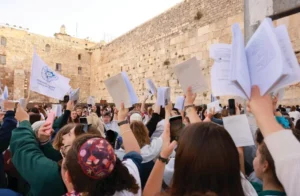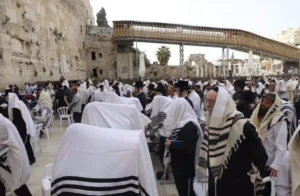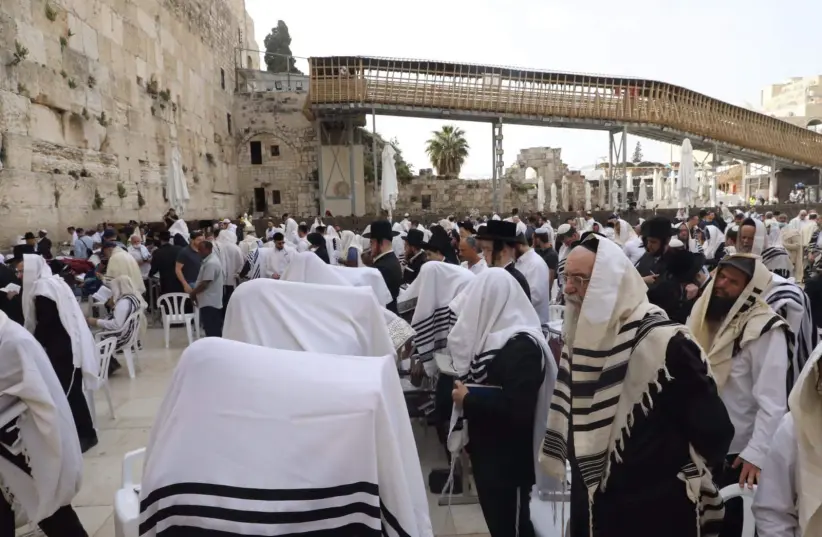RELIGIOUS AFFAIRS: The failure of the Western Wall compromise made the ultra-orthodox community more determined to take control.

Who would have ever thought that a group of haredi Israeli women would carry flags with the symbol of the World Zionist Organization while creating a pre-Independence Day prayer service at the Western Wall? As reported extensively, the event became violent when the women clashed with a Women of the Wall service. They were later criticized by WZO chairman Yaakov Hagoel.
These haredi women didn’t just happen to be at the Wall during a Rosh Hodesh prayer service, but, rather, wanted to send a message to heads of the Zionist movement that the movement’s support for organizations such as Women of the Wall is something they see as negative and wrong. The Orthodox prayer service was organized in cooperation with two WZO departments, headed by representatives of the World Shas and Eretz Hakodesh (the Holy Land) political factions.
That confrontation was another outgrowth of the cancellation of the Western Wall compromise exactly five years ago in June 2017.
Last week, The Jerusalem Post reported on the effects on Israeli society – mainly the rise in Israelis who see themselves as Reform or Conservative, but also the surge of organizations and individuals promoting Jewish peoplehood in Israel and the rise of alternative Jewish communities.
This week, the focus shifts to how the government’s cancellation of the compromise of establishing an egalitarian prayer plaza at the Western Wall empowered American ultra-Orthodox groups to become more active and vocal.

The liberals roused the orthodox
“THEY WOKE us up,” Rabbi Pesach Lerner declared in a conversation with the Post on Thursday, relating to the heads of the liberal movements. “We give credit to the Left and to the liberals who forced us to make our voices heard, whether in the national institutions or in front of decision-makers in Israel.”
“They woke us up.
“Rabbi Pesach Lerner
Lerner is executive vice president emeritus of the National Council of Young Israel, the parent organization of all Young Israel Orthodox synagogues in North America.
“I recently stepped down as president since activities at Eretz Hakodesh are occupying so much of my time,” he said.
He is president of Coalition for Jewish Values, founder and chairman of the Eretz Hakodesh Party in the World Zionist Organization, a new party that represents ultra-Orthodox Jewish communities in the US. Eretz Hakodesh participated in the elections for the Zionist Congress for the first time and finished in third place, just a few votes behind the veteran religious-Zionist slate.
Lerner is also a member of the Board of Governors of the Jewish Agency and one of the heads of Am Echad, a lobby organization claiming to represent the voice of Orthodox Jews from around the world – in Israel, mainly in the media and in front of Israeli politicians.
“We are trying to be active everywhere, while five years ago we barely existed in these institutions: We’re in the Jewish Agency, the JNF, the WZO. I’ve always said out loud, when we started becoming more active, [that] we would also ask questions.”
Lerner explained that it’s not just the Western Wall compromise and the noise that it made in Israel and in the organized Jewish institutions, but a lot more.
“The liberal Left had an unproportionate influence and ruled these institutions unfairly for so many years, an influence which did not reflect the true state of Diaspora Jewry,” Lerner stated.
He quoted a study by JPR, and published by the Post, exposing that the high growth rate among haredi Orthodox Jews has pushed their population past two million, accounting for as much as 80% of the total growth of the world’s Jewish population. It said the haredi population could double in size by the year 2040 to more than a fifth of the total Jewish population.
“We are growing and the others aren’t,” Lerner stated, but added that “I’m actually not happy about this situation – of more and more Reform and Conservative Jews assimilating, since we are losing so many Jews.”
He is under the impression that most of the American Jews who are members of Reform or Conservative synagogues aren’t interested in the implementation of the Western Wall compromise but rather the opposite. “A Reform Jew who doesn’t regularly go to synagogue every week doesn’t care about the Kotel discussion. It is the Reform leadership that is promoting the turmoil. Most American Jews are not members of anything Jewish or even interested.”
Lerner claimed that the heads of the progressive Jewish movements have “not challenged their community, are not growing and are not appealing to the young generation,” and therefore are trying to influence Israeli society. He mentioned the fact that one of the Hebrew Union Colleges for educating Reform rabbis has closed, and that “there is a huge shortage of Conservative rabbis across the US.”
Lerner continued: “Unfortunately, in America they [the progressive streams] are not growing or even holding their own. And now they’re coming to Israel.”
AM ECHAD, an organization founded tens of years ago, has reinvented itself after the discussions of the Western Wall compromise in 2018. Am Echad is now an ideological umbrella organization that sees itself as a representative of haredi and various types of Orthodox communities around the world – in Israel.
According to the organization’s website, it “aims to unite Jews from the Diaspora and Israel around the goals of preserving our 3,000-year-old heritage, deepening cooperation among our communities, and upholding Jewish interests in Israel and around the world. As ‘One Nation,’ we are committed to our Torah, the security of Israel and to loving all Jews.”
According to the site, “Am Echad advances this mission by fostering global Jewish dialogue, promoting public policy initiatives, and engaging in advocacy.”
In 2018, a group of 38 American-Jewish leaders, who had recently reestablished Am Echad, arrived in Israel and met with top Israeli leaders such as former prime minister Benjamin Netanyahu, former president Reuven Rivlin, senior ministers and haredi MKs.
“The crisis with American Jewry,” as it was called in the Israeli media, after the cancellation of the compromise, is “fake news,” Am Echad said.
According to these leaders, “Orthodox Judaism fully supports Israel, and it does not assimilate like the Reform and Conservative stream, but is actually becoming the next elitist group of American Jewry,” they told anyone who they met. The group was led by Shlomo (Sol) Werdiger, a businessman in the field of sports and chairman of Agudath Israel of America’s board of trustees.
Lerner was also one of the leaders of this delegation. “Till this first delegation and the establishment of Eretz Hakodesh,” he said, “when Israeli leaders wanted to hear what the Jews of the Diaspora had to say, they approached the World Zionist Congress, which had always been a center-left organization. But when we joined the Congress, we created a realization in these institutions [that] suddenly the national institutions are no longer positioned towards the Left.”
Lerner added that “the Knesset now knows that the Orthodox are the key people to speak to in the US. We have been organizing delegations of Israeli leaders and showing them our vibrant synagogues and schools, while at the same time these Israeli leaders, knocking on the doors of Reform and Conservative synagogues, find that they are closed midweek or not very active.”
He concluded by saying that “the bottom line is that the Orthodox Jews support Israel on its every move diplomatically and when it comes to issues of security, unlike the rabbinic students of the progressive movements who opposed Israel during the past operation in Gaza.”
In an interview to Mishpacha magazine in 2020, Lerner, who then was considered the “winner” of the Zionist elections, said that “because of the liberal movements’ dominant position in the WZO Education Department prior to this election, most of the education in Israeli schools was in Reform hands. Now, the Torah community will be in a position to influence that education.”
In 2021, the Queens Jewish Link published an article about a summit of Eretz Hakodesh in New Jersey. Shmuel Litov, vice chairman of Keren Kayemeth LeIsrael-Jewish National Fund as a representative of Eretz Hakodesh, mentioned that his presence in the Zionist organization allowed “one million dunams [100,000 hectares] of forest to go without new planting during shmita [the sabbatical].
The article mentioned that NIS 300 million was also allocated for land purchases across the Green Line to include communities of Judea and Samaria, like Betar Illit and Emmanuel,” the article mentioned.
The Jewish Link also featured this summit and quoted Lerner mentioning the acts they have already achieved in the national institutions “The Jewish Agency has begun searching for a haredi community member to serve in their aliyah department, to respond to the needs of the haredi public; Nefesh B’Nefesh has added a haredi desk to their organization; the KKL-JNF has begun funding programs in eight Jewish communities over the Green Line, many of them haredi.”
According to the Jewish Link, Lerner also stated in 2021 that “two busloads of teachers from US haredi communities will be participating in a KKL-JNF teachers mission to Israel in January 2022.”
A SENIOR official of one of the larger American Jewish organizations said that, in perspective, “I think anybody who was involved in the negotiations [of the Western Wall compromise] feels deeply and personally about it.”
Yet he doesn’t think that this is something as dramatic as it’s portrayed in the Jewish and Israeli media. “We’re still proud of the agreement. We still think it’s a good agreement, but it’s not the main focus of most of the organized Jewish-American organizations.
“It’s one issue among many issues that are prominent in the dialogue between Israel and the non-Orthodox, progressive streams in North America. And that’s it.
“I don’t think I’ve spent five minutes on the implementation of the Kotel compromise in the past few years,” he said, “but we have definitely spent lots of time on these religious wars.”
He explained that one of the significant changes in the organized Jewish-American world is that more and more Orthodox or ultra-Orthodox leaders have become more active in promoting their views against the compromise, in various institutions in which they weren’t active five years ago.
“I think that American Jews need to understand that we have differences of opinion among ourselves on these issues, and to portray this as if Israel is on one side and the Jewish community in North America is on the other side is not an accurate portrayal.”
The American-Jewish official specified that most of American Jewry supports the Western Wall compromise – “probably somewhere between 70% or 80% – but it’s certainly not unanimous. And therefore, the idea that those who disagreed want to make sure their voice is heard is a completely appropriate thing for them to do. The only question is whether or not it’s done with civility and through appropriate channels. In my opinion, the election of the World Zionist Congress is an appropriate channel to pursue that agenda.”
THAT AMERICAN haredim have become involved in these types of organizations – connected to Israel and affiliated as Zionist – is an earthquake of its own: Many senior ultra-Orthodox rabbis have approved the establishment of Eretz Hakodesh and allowed their students to vote; some even encouraged it. An Ami Magazine survey, published in 2020, showed that 88% of Orthodox Jews in the US declared themselves pro-Israel, compared to 12% who do not identify as such; 36% of them identify with the Zionist movement, compared to 52% who consider themselves pro-Israel, but are not identified with Zionism.
The haredi-American community, which used to be anti-Zionist at its core, is now very different.
Rabbi Josh Weinberg, head of Arza, the American Reform movement’s Zionist organization, said on Thursday that he still hasn’t given up on the Western Wall compromise. “I think a lot of people had expectations from the new government and the current coalition to implement the deal. We need to understand that even if it is not implemented immediately, we need to be sensitive to the complexity of the coalition and to understand that it involves compromises.”
Relating to the haredi influence in the national institutions, he responded, “I think it must be a call for Diaspora Jews to understand that we have a say in the matter, and that we must make our voice heard. We have rights; we need to be recognized.”
Weinberg added that “not only is there more than one way to be Jewish, there is more than one way to be religious. We are open to different ways of religious observance. The ultra-Orthodox feel threatened by this approach.
“The thing is, I don’t want to abolish the ultra-Orthodox. I am a liberal; I want them to live in peace by my side. I know they will not see me as an equal Jew, but the State of Israel is a democratic state and it needs to see me and my colleagues as equals.”
Weinberg said that “the past few years of not implementing the Kotel compromise were a disappointment and another reminder of the ongoing ultra-Orthodox monopoly despite the new government. It was really a reminder of the hatred and incitement against us. In the past year, we have received incitement from the opposition chairman himself, who used this to build a base and overthrow the current government. I think it exposed the Israeli leadership which just doesn’t understand us.”•

